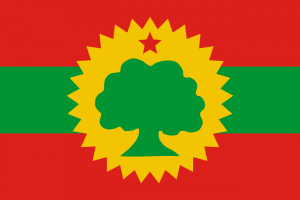Language/Borana-arsi-guji-oromo/Vocabulary/Express-Surprise
Hi Borana-Arsi-Guji Oromo learners! 😊
In this lesson, we will learn how to express surprise in Borana-Arsi-Guji Oromo. We will also include some cultural information and interesting facts to enhance your learning experience. Don't forget that to improve your Borana-Arsi-Guji Oromo vocabulary, you can also use the Polyglot Club website. Find native speakers and ask them any questions!
Expressing surprise[edit | edit source]
Surprise is an emotion that can be expressed in different ways in Borana-Arsi-Guji Oromo. Let's take a look at some common expressions:
| Borana-Arsi-Guji Oromo | Pronunciation | English Translation |
|---|---|---|
| "Eeca!" | (AA-cha) | "Wow!" or "Oh my goodness!" |
| "Yaa Rabbii!" | (YAH ra-BEE) | "Oh God!" |
| "Golu fiiraa!" | (GO-loo FEE-rah) | "Unbelievable!" |
| "Barri haadhaa?" | (BAR-ree HAA-dhaa) | "Is this true?" |
Here is an example dialogue to see these expressions in context:
- Person 1: "Lafaa fi dhiifamaa haadhaa qaba" (I won the lottery)
- Person 2: "Eeca!" (Wow!)
Cultural information[edit | edit source]
In Borana-Arsi-Guji Oromo culture, surprise can be expressed in various ways depending on the context. For example, when hearing good news, people might say "Eeca!", "Yaa Rabbii!" or "Golu fiiraa!" to show their excitement. On the other hand, when hearing bad news, people might use the expression "Ajjeecha" (AA-jee-cha) which means "Alas!" or "Oh no!".
Borana-Arsi-Guji Oromo also has a rich oral tradition of storytelling and poetry, where surprise can be an important element. Traditional Oromo poets, known as "Abbaa Ta'a" or "Abbaa Laga", often used surprise in their works to evoke emotions in the audience.
Interesting Facts[edit | edit source]
- Borana-Arsi-Guji Oromo is one of the largest dialect groups of the Oromo language spoken in Ethiopia, Kenya, and Somalia.
- The Oromo people have a unique culture that includes the Gadaa system, a form of governance that revolves around a seven or eight-year cycle of power and leadership.
- Oromo music is an important part of the culture, and traditional instruments such as the "Maalii" (a wooden flute) and "Qeerroo" (a stringed instrument) are widely used.
- Coffee (called "Buna" in Oromo language) is a staple beverage in the Oromo culture and is often served during social gatherings and ceremonies.
Conclusion[edit | edit source]
In this lesson, we have learned some expressions to express surprise in Borana-Arsi-Guji Oromo, as well as some cultural information and interesting facts about the Oromo people. To further enhance your language learning experience, don't forget to practice with native speakers. Find native speakers and ask them any questions!
➡ If you have any questions, please ask them in the comments section below.
➡ Feel free to edit this wiki page if you think it can be improved. 😎
Sources[edit | edit source]
Upon wrapping up this lesson, take a look at these related pages: Health & Days of the Week.

